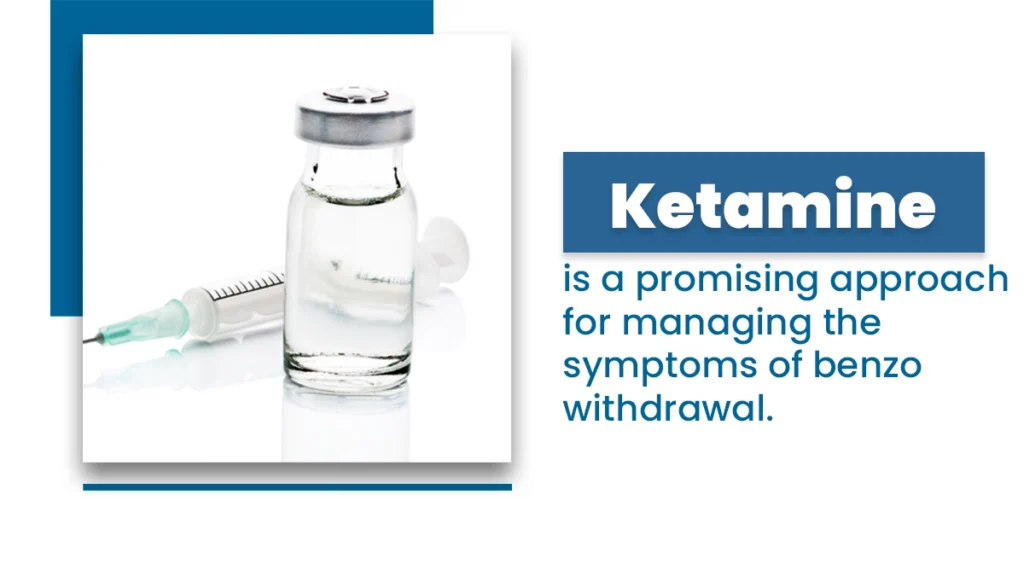Benzodiazepines, commonly prescribed for anxiety and sleep disorders, pose significant risks of dependence and withdrawal symptoms upon ending their use. On the other hand, ketamine, primarily known as an anesthetic and recreational drug, has gathered attention for its potential in treating benzodiazepine withdrawal.
This article provides a concise introduction to the pros and cons of using ketamine in managing benzodiazepine withdrawal, offering insights into its pharmacological mechanisms and emerging research findings.
Key Takeaways
Benzodiazepine withdrawal typically requires careful management under medical supervision. Here is what you need to know:
- Ketamine offers rapid relief during benzodiazepine withdrawal, potentially reducing panic attacks.
- Combining ketamine with comprehensive strategies improves benzodiazepine withdrawal outcomes.
- Gradual tapering under medical supervision is crucial for safe benzodiazepine withdrawal.
At The Haven Detox-New England, find compassionate care and expert support for your recovery journey – call (844) 933-4145 to begin.

Introduction To Ketamine And Benzo
Ketamine and Benzos are both types of medications that affect the brain. Ketamine is often used as an anesthetic in surgeries and can also be prescribed to treat depression. It works by blocking specific signals in the brain.
Benzos, short for benzodiazepines, are commonly prescribed for anxiety and sleep disorders. They help calm the brain by enhancing the effects of a natural GABA chemical. While both can be helpful when used as directed, they can also be addictive if misused.
The Process Of Benzo Withdrawal
Benzodiazepine withdrawal can be a challenging process for individuals who have developed a dependence on these medications. It’s crucial for individuals undergoing benzodiazepine withdrawal to seek professional medical guidance to ensure a safe withdrawal process. Abrupt suspension or unsupervised tapering of benzodiazepines can lead to severe withdrawal symptoms.
Understanding Benzo Dependency
Benzodiazepines, commonly known as benzos, are medications prescribed to treat anxiety, insomnia, and seizures. When taken regularly, the body may become dependent on them, leading to withdrawal symptoms when stopped.
This dependency can develop even when taken as directed by doctors. Some people may misuse benzos, taking higher doses or using them without a prescription, which increases the risk of dependency and withdrawal.
Common Effects Of Benzo Withdrawal
Benzo withdrawal can cause various symptoms, including anxiety, insomnia, irritability, muscle stiffness, tremors, and even seizures in severe cases. These symptoms can be stressful and challenging for patients to cope with.
Additionally, withdrawal may also exacerbate underlying mental health conditions, such as treatment-resistant depression, making it crucial for individuals undergoing withdrawal to receive proper support and treatment.
Approaches To Benzo Withdrawal
Treatment for benzodiazepine withdrawal often involves slow reduction of the medication under the supervision of a doctor. This approach helps the body adjust to decreasing levels of the drug, minimizing withdrawal symptoms.
In some cases, doctors may prescribe other medications to manage specific symptoms, such as antidepressants for depression or medications to address respiratory depression. Additionally, counseling and support groups can be beneficial for individuals going through Benzo’s withdrawal, providing emotional support and coping strategies.
The Role Of Ketamine In Benzo Withdrawal
Ketamine, primarily known as a dissociative anesthetic, plays a role in managing benzodiazepine withdrawal. Ketamine has a potential for abuse and dependence, so its use should be closely monitored, especially in individuals with a history of substance abuse.
Overview Of Ketamine’s Mechanism Of Action
Ketamine is a medication primarily used for anesthesia and pain relief. It works by blocking specific receptors in the brain, including NMDA receptors, which are involved in pain sensitivity and memory development. Additionally, ketamine can affect the release of various neurotransmitters, including dopamine and serotonin, which play roles in mood regulation.
How Ketamine Supports The Withdrawal Process
During benzodiazepine withdrawal, individuals may experience intense cravings, physical symptoms, and depressive symptoms due to changes in neurotransmitter activity. Ketamine can help alleviate these symptoms by modulating neurotransmitter levels and reducing the severity of withdrawal symptoms. Its rapid onset of action is particularly useful in providing quick relief during withdrawal.
Studies Supporting The Use Of Ketamine
Several studies have investigated the effectiveness of ketamine in the treatment of benzodiazepine withdrawal. These studies have shown that ketamine infusions can significantly reduce cravings, physical symptoms, and depressive symptoms associated with withdrawal. Healthcare providers may consider ketamine infusion therapy as part of a comprehensive treatment plan.
Pros And Cons Of Using Ketamine For Benzo Withdrawal
Using ketamine for benzodiazepine withdrawal is a relatively new approach in recent years. Ketamine shows promise as a treatment for benzodiazepine withdrawal, but it also carries risks and limitations that should be carefully considered.
Here are some potential pros and cons:
Advantages Of Ketamine Use
Ketamine shows promise in managing benzodiazepine withdrawal symptoms due to its rapid onset of action within hours. Medical professionals can administer it in controlled settings to minimize both physical withdrawal symptoms and psychological dependence.
Additionally, it may reduce the risk of panic attacks during the detox process. Its potential role in addressing opioid abuse alongside benzodiazepine use makes it a flexible option when used in combination with adjunctive medications and therapies like cognitive-behavioral therapy.
Potential Drawbacks And Risks
However, the use of ketamine for benzodiazepine withdrawal isn’t without risks. While it can be effective, there are concerns about its abuse potential and the need for close monitoring by medical professionals. Some individuals may experience adverse effects such as dissociation or hallucinations during treatment.
Furthermore, the long-term effects of ketamine use are still being studied, raising questions about its safety as a treatment option. Incorporating other therapies, like group therapy alongside ketamine treatment, may help diminish these risks.
Comparison To Other Intervention Methods
When comparing different intervention methods, it’s essential to consider their effectiveness and safety. While some methods may focus on addressing physical symptoms, others target psychological aspects of withdrawal. Each approach has pros and cons, depending on individual needs and circumstances.
How Ketamine Compares To Other Withdrawal Aids
Ketamine, though promising, isn’t the only option for managing withdrawal. Unlike traditional benzodiazepine tapering, ketamine therapy offers rapid relief from acute psychological symptoms. However, weighing its benefits against potential risks, such as dissociative effects and dependency, is essential.
In assessing ketamine’s role as a withdrawal aid, it’s vital to compare its mechanisms and outcomes with those of established interventions. Other aids, such as prescription medications and holistic therapies, offer alternative avenues for managing withdrawal symptoms and promoting long-term recovery.
Evaluating each approach’s comparative advantages and limitations informs personalized treatment plans tailored to individual needs and circumstances.
Therapeutic Strategies In Combination With Ketamine
Combining ketamine with therapeutic strategies enhances its effectiveness in managing withdrawal. Medical management of benzodiazepine withdrawal, coupled with ketamine therapy, addresses both physical and psychological aspects.
This approach ensures acute life-threatening withdrawal is properly managed while addressing underlying medical conditions. Temporary increases in ketamine dosage may be necessary during acute phases, followed by long-term use to sustain benefits.
Treatment centers offering comprehensive care, including therapy and prescription medications, optimize outcomes for individuals grappling with drug addiction. Such integrated approaches prevent significant deterioration and support positive trajectories of recovery.
Frequently Asked Questions (FAQs)
How can someone safely stop using ketamine without experiencing withdrawal symptoms or causing harm to their body?
To safely stop using ketamine without experiencing withdrawal symptoms or causing harm to the body, it’s crucial to seek medical advice. Gradually tapering off ketamine over several weeks under medical supervision can help minimize withdrawal effects associated with its impact on NMDA receptors.
Additionally, exploring different treatments for depression, as ketamine often produces antidepressant effects, can be beneficial. If facing Ketamine addiction, seeking support from a treatment facility specializing in substance abuse is advisable. Remember, professional guidance ensures a safer transition and reduces the risk of withdrawal symptoms or harm to the body.
What are some of the symptoms of ketamine withdrawal?
Symptoms of Ketamine withdrawal can vary but often include anxiety, depression, irritability, and trouble sleeping. Due to the potential role of ketamine in affecting NMDA receptors, individuals may experience physical discomforts such as sweating, tremors, and muscle cramps.
In some cases, participants may display symptoms resembling benzodiazepine withdrawal syndrome, highlighting the need for medical supervision. Seeking support in a medical setting is crucial, as severe withdrawal symptoms can arise even after a short period of use, especially in those with high tolerance.
Without proper care, significant setbacks in mental health and functioning may occur, highlighting the importance of accessing treatment centers for standard care.
What is the safest and most effective way to stop taking benzos without experiencing withdrawal symptoms or seizures?
The safest and most effective way to stop taking benzodiazepines (benzos) without experiencing withdrawal symptoms or seizures is through a slow tapering process under medical supervision. This involves reducing the dosage slowly to allow the body to adjust without triggering withdrawal reactions.
Medical professionals can tailor the tapering schedule to individual needs, monitoring for any signs of discomfort or adverse effects. Additionally, combining supportive therapies such as counseling or behavioral interventions can aid in managing any psychological symptoms that may arise during the tapering process. Seeking guidance from healthcare providers ensures a smoother transition and reduces the risk of withdrawal complications.
Discover Renewal At The Haven Detox-New England
Are you struggling to break free from substance use disorder? At The Haven Detox-New England, we understand your overwhelming pain and challenges.
Our medical detox offers compassionate care and expert support to cleanse your body safely, providing a crucial foundation for your recovery journey.
Additionally, our residential treatment provides a comprehensive approach to recovery, combining evidence-based therapies with personalized plans tailored to your needs.
Call us at (844) 933-4145, and let us rebuild your life.
Verify Insurance
Let’s get you or a loved one help with a few simple steps.




